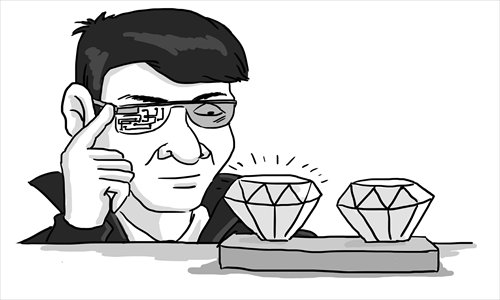Cops need brand savvy to catch the corrupt

Anti-corruption inspectors in Beijing have been trained to recognize high-end products as well as precious artifacts in order to hone their skills to detect and crack down on corrupt practices, according to an official from the CPC Beijing Municipal Commission for Discipline Inspection recently.
The official explained, in one case, many inspectors were completely ignorant of the fact that a diamond-studded pair of glasses could cost millions of yuan. The lack of knowledge has compromised the ability of inspectors.
The public response to the initiative has, however, ranged from cool to cynical: How necessary is it for anti-corruption officials to gain expertise in premium brands? How useful is that knowledge in their daily work? Is it a waste of taxpayers' money?
The public's suspicion of the move comes from their dissatisfaction with increasingly rampant corruption and the lack of progress to root it out. They also question the effectiveness of anti-graft efforts. As some have pointed out, if regular Internet users can raise the alarm over corruption by looking carefully at a couple of published pictures of an official and help bring him down, why can't the inspectors do the same?
The case the public referred to concerns an official by the name of Yang Dacai in Shaanxi Province. Netizens found pictures of Yang wearing numerous expensive wristwatches on various occasions.
As a result, Yang was put under investigation and then dismissed, becoming the latest prey of Chinese Internet sleuths.
The case demonstrates the powerful role bloggers play in today's China. Their questioning and criticism should be respected and heeded by officials in charge of anti-corruption work. However, the training of disciplinary inspectors on luxury products is necessary and has a practical purpose in detecting corrupt acts.
First of all, disciplinary inspectors have their strengths in investigation and meting out punishments, but not necessarily the skills and knowledge of luxury products.
Secondly, conspicuous consumption by officials often leads to legitimate concerns, considering the fact that the average salary of a Chinese official stands at about 5,000 yuan ($793) a month. If an official is discovered with expensive personal accessories, he or she has to provide a convincing explanation for that possession.
Knowledge of luxury items is required to meet the current demand of anti-corruption efforts. A survey based on 100 random court cases in Beijing between 2005 and 2007 shows that in recent years, the main category of bribes to government officials have been small but expensive items, way ahead of houses and luxury sedans. Those items are usually low-profile and difficult to immediately detect.
Here's an example. The most expensive pair of Lotos glasses is said to be studded with 44 diamonds, with a price of about that of a Bentley. Anti-corruption officials, unless they have professional skills, would be hard-pressed to sniff out millions of yuan worn on crooked officials' noses.
The State Council has issued a new set of rules, asking officials to follow a "frugal working style." The rules, which go into effect at the beginning of October, prevent officials from splashing out on lavish banquets or fancy cars and accepting expensive gifts.
Under the new environment, inspectors equipped with the necessary knowledge and skills of top brands will prove to be more effective than those without when tracking down wrongful behavior.
Studying up on how to recognize top brands is necessary, but not necessarily the most important tool in the box to truly stamp out corruption. Much more work needs to be done in order to curb the spread of corruption, such as the declaration of personal assets of government officials, transparency of government expenditures and the strengthening of accountability mechanisms.
Furthermore, the increasingly potent role of Internet users is de facto an integral part of China's overall efforts to fight corruption. Public oversight and government efforts are not in opposition to each other. Instead, they should join hands against those "illegally fashionable" officials.
The author is a commentator on current affairs with China Radio International. opinion@globaltimes.com.cn